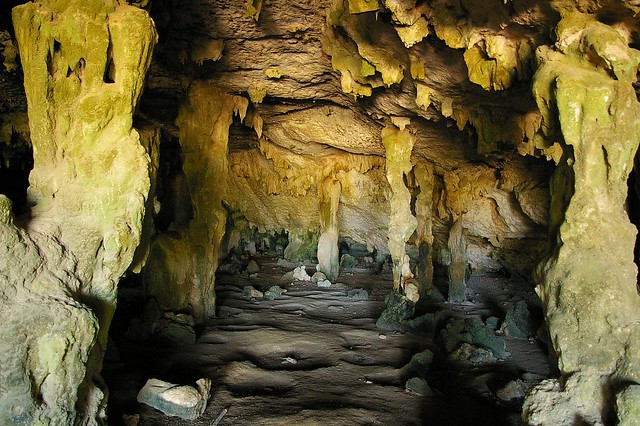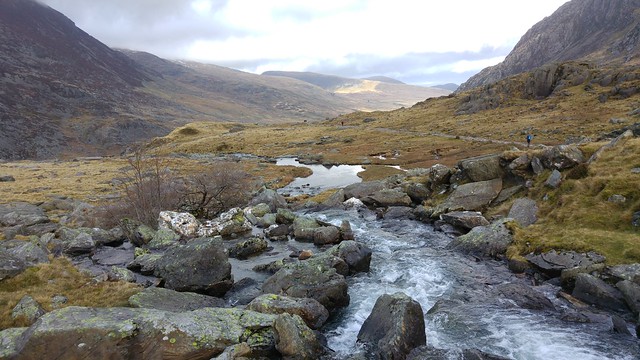Hre are a few words for caves, hollows and related things in Celtic languages.
Words marked with a * are reconstructions.
| Proto-Celtic | *oumā = cave |
|---|---|
| Old Irish (Goídelc) | úam = cave |
| Middle Irish (Gaoidhealg) | úam, úaim, úama = cave, den, lair, cellar, crypt, vault, grave, tomb, pit úamach = a cave-dweller |
| Irish (Gaeilge) | uaimh [uəvʲ] = cave, souterrain, underground chamber, cellar, crypt, vault, den of thieves, pit uaimheadóireacht = exploration of caves, potholing uaimheolaí = speleologist uaimheolaíocht = speleology uaimheolaí = speleologist uaimh ifrinn = pit of hell uaimh ladrann = den of thieves |
| Scottish Gaelic (Gàidhlig) | uamh [ũə̃v] / uaimh = cave, den, hollow, grave, grotto uamh-thalmhainn = souterrain, underground passage |
| Manx (Gaelg) | oghe = cave, oven ooig = den, cavern, grotto, antar, pit, stope, hotbed, cave ooig-oaylleeaght = speleology |
| Middle Welsh (Kymraec) | guocof, guocob, gogof = cave guocobauc, ogouawc, gogofawg = full of caves, cave-like, cavernous |
| Welsh (Cymraeg) | (g)ogof [ˈɔɡɔv / ˈoːɡɔv] = cave, cavern, grotto, cleft, cavity, den, lair ogofa = to explore caves, caving, pot-holing, speleology ogofaidd = cave-like, cavernous ogofaog = cave-like, cavernous, fulls of caves ogofäwr = caver, pot-holer (g)ogofog = full of caves, cave-like, cavernous ogofwr = cave-dweller, troglodyte ogof l(l)adron = den of thieves |
| Middle Cornish (Cernewec) | ogo, ogos = cave, cavern |
| Cornish (Kernewek) | gogow = cave, cavity |
Etymology: from the Proto-Indo-European *h₁ewn- (empty) [source].
| Old Irish (Goídelc) | fochla = burrow, burrowing, den, digging |
|---|---|
| Middle Irish (Gaoidhealg) | fochla = digging, rooting, burrowing, cavity, hole, burrow, den fochlach = hiding-place fochlaid = burrowing, undermining, uprooting, cavity, hole, pit |
| Irish (Gaeilge) | uachais = burrow, cavity, lair, den |
| Scottish Gaelic (Gàidhlig) | fuathais = den (obsolete) |
| Proto-Brythonic | *fowyā = den, lair, cave |
| Middle Welsh (Kymraec) | ffeu, ffau = den, lair, cave |
| Welsh (Cymraeg) | ffau = den, lair, burrow, set, covert, cave |
| Middle Cornish (Cernewec) | fow = den, cave, a lurking place of wild beasts |
| Cornish (Kernewek) | fow = cave |
Etymology: from the Latin fovea (pit, hole in the ground, snare) the Proto-Indo-European *bʰow- (pit, hole) [source].
| Proto-Celtic | *tullos/*tullom = pierced, perforated, hole |
|---|---|
| Old Irish (Goídelc) | toll = perforated, pierced, hole tollaid = to pierce, perforate |
| Middle Irish (Gaoidhealg) | toll = pierced, perforated; hollow, empty, tonsured, vain, ineffective; hole, fault; buttocks tollad = act of piercing, attacking, penetrating, impugning tollaid = piereces, penetrates tollus = perforation tretholl = piereced, hollow tuille = hollowness |
| Irish (Gaeilge) | toll [t̪ˠoːl̪ˠ/t̪ˠəul̪ˠ/t̪ˠʌl̪ˠ] = hole, hollow, posterior, buttocks, piereced, perforated, empty, deep (voice), to bore, pierce, perforate tolladh = borning, perforation tolladóir = borer, piercer, perforator tolladóireacht = (act of) boring tollán = tunnel tollmhór = big-bottomed, bumptious tolltach = piercing, penetrating |
| Scottish Gaelic (Gàidhlig) | toll [tɔul̪ˠ] = hole, penetration, hole, hold (of a ship); to bore, perforate, gore toll-guail = coalpit toll-iuchrach = keyhole toll-putain = buttonhole toll-sìolaidh = plughole tolltach [tɔul̪ˠdəx] = full of holes, holed tolta [tɔul̪ˠdə] = bored, perforated, gored tollan [tɔl̪ˠan] = orifice |
| Manx (Gaelg) | towl = aperture, bore, cavity, crater, hole, hollow, leak, penetration, pothole, shaft, vent towl buird = pigeonhole towl conning = rabbit hole towl dhull = plughole towl doo = black hole yn towlagh = penetrable |
| Middle Welsh (Kymraec) | tull, twll, twlh = hole, hollow, pit |
| Welsh (Cymraeg) | twll [tʊɬ] = hole, aperture, dimple, hollow, pit, cave, burrow, den, orifice twll agoriad, twll (y) clo = keyhole twll botwm = buttonhole twll cath = cat-flap, cat-door twll cesail. twll y gesail = armpit twll cwinngen = rabbit burrrow twll du = black hole twll (y) grisiau = stairwell |
| Middle Cornish (Cernewec) | toll = hole, perforation tolcorn = flute, fife (“horn with holes”) tollec = full of holes, perforated, hollow tolly = to make a hole, to perforate |
| Cornish (Kernewek) | toll = burrow, hollow, hole, opening, orifice toll alhwedh = keyhole toll boton = button hole toll konin = rabbit burrow toll lavrek = fly (in trousers) toll y’n fos = cash dispenser (“hole in the wall”) tollek = holed, leaky, perforated |
| Old Breton | tull = foramen (aperture or opening produced by boring) |
| Middle Breton (Brezonec) | toull = pierced, leaky, deep, hollow, empty; hole toulladur = digging, excavation, piercing |
| Breton (Brezhoneg) | toull [ˈtulː] = holed, pierced, hole, embrasure, entrance toull du = black hole toulled = thole (pin) toullet = perforated |
Etymology: from Proto-Indo-European *tewk- (to push, press, beat, pierce, perforate), from *(s)tew- (to push, hit) [source].
Words from the same Proto-Celtic root include tollo (hole in the ground where hunters hide, rainwater puddle) in Spanish, toll (pool, puddle) in Catalan, tol (ditch, dam) in Galician [source].
Words from the same PIE root possibly include tkát (to weave) in Czech, tkać (to weave, stick, tuck) in Polish, and тъка [tɐˈkɤ] (to spin, plait, entwine, weave) in Bulgarian [source].
| Proto-Celtic | *kuwo-/*kawyos = hollow |
|---|---|
| Old Irish (Goídelc) | cúas = hollow, cavity, cave |
| Middle Irish (Gaoidhealg) | cúa, cuae, cua, cúe = hollow, empty’ bell-shaped cup, nut cuäch, cúach = cup, goblet, bowl, cauldron cúachda, cuachda = cupped, hollow cúas, cús = hollow, cavity, cave, cavern, lair, den, shelter cuithe = put, pitfall, prison, dungeon, well, pool, whirlpool |
| Irish (Gaeilge) | cuas = cavity, hollow, recess, cove, creek cuasach = cavernous, hollow, concave cuasacht = concavity cuasán = (small) cavity |
| Scottish Gaelic (Gàidhlig) | cuas [kuəs] = hollow, cave, cavity cuasach [kuəsəx] = cavernous cuasan [kuəsan] = small hollow/cavity, small cave |
| Proto-Brythonic | *kow = hollow |
| Middle Welsh (Kymraec) | cev, keu, kau = hollow, empty, sunken |
| Welsh (Cymraeg) | cau = hollow, empty, sunken, false, deceitful, enclosing, shut, closed, vacuum, cavity, inwards, bowels yghau = closed, shut |
| Middle Cornish (Cernewec) | *cew = hollow |
| Cornish (Kernewek) | kew = hollow, enclosed field, paddock, small enclosure |
| Old Breton (Brethonoc) | cau = covered |
| Middle Breton (Brezonec) | queu, keu, kev = hollow, concave, deep que = cavity, cave |
| Breton (Brezhoneg) | kev = cave, concave, hollow, cavity kevded = concavity keviadur = excavation kevian, keviañ = to excavate |
Etymology: from Proto-Indo-European *kewh- (vault, hole) [source]. , or from *ḱowh₁ós (hollow), from *ḱewh₁- (to swell) [source]. The English words cave and cavity come from the same roots.
The Breton word kavarn (cave, cavern, den, lair) comes from the same PIE root, probably via the Latin caverna (hollow, cavity, cave, cavern), from cavus (hollow, concave), from the Proto-Italic *kawos [source].
Other words in Breton for cave are groc’h, mougev and roc’h toull. There don’t appear to be any cave-related words that are cognate with the other Celtic languages.
Sources: Wiktionary, Am Faclair Beag, Online Manx Dictionary, Teanglann.ie, eDIL – Electronic Dictionary of the Irish Language, In Dúil Bélrai English – Old Irish glossary, Geiriadur Prifysgol Cymru, Gerlyver Kernewek, Dictionaire Favereau, TermOfis, English – ProtoCeltic WordList (PDF), Etymological Dictionary Of Proto Celtic





